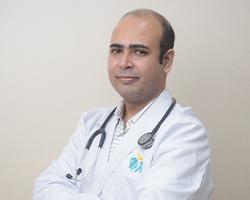Search Result: 7

Dr Kamal Chetri
MD; DNB; DM (GASTROENTEROLOGY; SGPGIMS)
Registration No
1244120
Language
English, हिंदी

17 years experience overall

Guwahati , Guwahati
MON- SAT(01:00 PM-03:00 PM)

Dr Mukesh Agarwala
MD(MED), DNB(GASTRO)
Registration No
1244122
Language
English, हिंदी

9 years experience overall

Guwahati , Guwahati
MON- SAT(03:00 PM-06:00 PM)

Dr Prashant Kumar Rai
MBBS. MD, DM (Gastroenterology)
Registration No
5592357
Language
English, हिंदी

9 years experience overall

Paschim Boragaon , Guwahati
MON- SAT, MON- SAT(09:00 AM-05:00 PM)

Dr Roshan Agarwala
MD,DM, Trained in Advanced Endoscopy, South Korea
Registration No
2039326
Language
English, অসমিয়া, বাংলা, हिंदी

7 years experience overall

Guwahati , Guwahati
MON- THU, SAT, MON- THU, SAT(10:00 AM-03:00 PM)

Dr Shubham Purkayastha
MBBS, MD, DM (Gastroentereology)
Registration No
4329115
Language
English, অসমিয়া, বাংলা, हिंदी

7 years experience overall

Paschim Boragaon , Guwahati
MON- SAT, MON- SAT(10:00 AM-05:00 PM)

Dr Mayank Agarwal
MBBS, MD(MEDICINE), DM(GASTROENTEROLGY)
Registration No
3979446
Language
English, অসমিয়া, বাংলা, हिंदी

20 years experience overall

Guwahati , Guwahati
MON- SAT(08:00 AM-09:30 AM)

Dr Pranjal Deka
"MBBS (Gold Medallist), MS, MCh FEBS (Multi Organ Retrieval & Liver Transplant) "
Registration No
1924207
Language
English

10 years experience overall

Guwahati , Guwahati
MON- FRI(09:00 AM-11:00 AM, 05:30 PM-07:00 PM)
Frequently Asked Questions for Whipple procedure in Guwahati
The life expectancy after a Whipple procedure depends on various factors including the stage of cancer, overall health, and response to treatment.
While laparoscopic or minimally invasive techniques are being explored for certain aspects of the Whipple procedure, it is still primarily performed as an open surgery.
Some common long-term problems after a Whipple procedure include digestive issues like diarrhea, weight loss, diabetes due to reduced insulin production, delayed gastric emptying, and vitamin deficiencies.
In most cases, adjuvant chemotherapy (chemotherapy given after surgery) is recommended after a Whipple procedure for pancreatic cancer.
The duodenum is removed in a Whipple procedure because it is located close to the head of the pancreas, where many pancreatic tumors arise.
The eligibility criteria for a Whipple procedure depend on specific factors such as the stage and location of the cancer, the overall health of the patient, and the absence of major organ dysfunction.
In a Whipple procedure, the head of the pancreas, gallbladder, duodenum, and a portion of the bile duct are removed.
After a Whipple procedure, you will need to stay in the hospital for observation and recovery.
The duration of a Whipple procedure can vary depending on various factors such as the complexity of the case and the surgeon’s experience.
The effectiveness of the Whipple procedure varies depending on several factors, including the patient’s overall health, the stage of cancer, and the surgeon’s expertise.
The recovery time for a Whipple procedure can vary from patient to patient.
Before a Whipple procedure, you may need to undergo several tests and scans to evaluate your overall health and determine if you are a suitable candidate for surgery.
A Whipple procedure is typically performed by a surgical oncologist or a general surgeon who specializes in gastrointestinal surgeries.
There are two main types of Whipple procedures: the standard Whipple procedure and the pylorus-preserving Whipple procedure.
Related Procedures in Guwahati
- Doctors for Appendicitis in Guwahati
- Doctors for Inguinal Hernia in Guwahati
- Doctors for Incisional Hernia in Guwahati
- Doctors for Endoscopy in Guwahati
- Doctors for Colonoscopy in Guwahati
- Doctors for Umbilical Hernia in Guwahati
- Doctors for Whipple procedure in Guwahati
- Doctors for ERCP Stone Removal in Guwahati
- Doctors for Epigastric Hernia in Guwahati
- Doctors for Sleeve gastrectomy in Guwahati
- Doctors for Piles Surgery in Guwahati
- Doctors for Gallstones Removal in Guwahati
Related Treatments in Guwahati
- Doctors for Cirrhosis Treatment in Guwahati
- Doctors for Constipation Treatment in Guwahati
- Doctors for Crohns Disease Treatment in Guwahati
- Doctors for Gallstones Treatment in Guwahati
- Doctors for Irritable Bowel Syndrome Treatment in Guwahati
- Doctors for Portal Hypertension Treatment in Guwahati
- Doctors for Rectal Prolapse Treatment in Guwahati
- Doctors for Ulcerative Colitis Treatment in Guwahati
Other Specialities in Guwahati
- Best Urologist in Guwahati
- Best Pulmonologist in Guwahati
- Best General Physician in Guwahati
- Best Endocrinologist in Guwahati
- Best Cardiologist in Guwahati
- Best Oncologist in Guwahati
- Best Radiologist in Guwahati
- Best Orthopedics in Guwahati
- Best Hepatologist in Guwahati
- Best Gynecologist in Guwahati
- Best Dermatologist in Guwahati
- Best Gastroenterologist in Guwahati
- Best Psychologist in Guwahati
- Best Ent Specialist in Guwahati
- Best Nephrologist in Guwahati
- Best Rheumatologist in Guwahati
- Best Diabetologist in Guwahati
- Best Psychiatrist in Guwahati
- Best Neonatologist in Guwahati
- Best Dentist in Guwahati
- Best Dietitian in Guwahati
- Best Haematologist in Guwahati
- Best Pediatrics in Guwahati
- Best General Surgeon in Guwahati
Top Hospitals in India
- Hospitals in Ahmedabad
- Hospitals in Bangalore
- Hospitals in Bhubaneswar
- Hospitals in Bilaspur
- Hospitals in Chennai
- Hospitals in Delhi
- Hospitals in Guwahati
- Hospitals in Hyderabad
- Hospitals in Indore
- Hospitals in Kolkata
- Hospitals in Madurai
- Hospitals in Mumbai
- Hospitals in Mysore
- Hospitals in Nashik
- Hospitals in Noida
- Hospitals in Visakhapatnam
- Hospitals in Lucknow
- Hospitals in Bhopal
- Hospitals in Karur
- Hospitals in Kochi
- Hospitals in Nellore
- Hospitals in Trichy
- Hospitals in Kakinada
© Copyright 2024. Apollo Hospitals Group. All Rights Reserved.




 Call Now
Call Now







